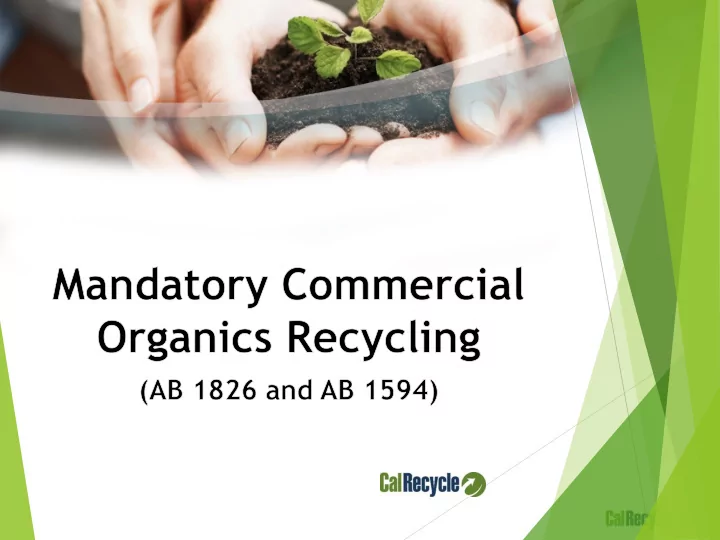

AB 32 Policy Drivers • ARB S coping Plan – Waste S ector • Reduce GHGs to < 1990 levels AB 939 • S LCP – divert 90% of organics 50% diversion requirement • by 2025, effectively eliminate for j urisdictions organics disposal in CA landfills AB 341 75% reduction, recycling, composting statewide goal by • 2020 Not transformation or disposal-related activities, etc. • Doesn’ t change AB 939 mandate on j urisdictions or how • CalRecycle evaluates compliance
Projected 2020 tonnages Million Metric Tons (MT) to reach 75% recycling More Recycled by 2020 37 MT 23 MT Recycled Amount in 20 MT 2012 Still could be Disposed in 2020 3
AB 1826 Business Requirements April 2016 - Businesses generating 8 CY organics/ week required to have organic waste recycling Jan 2017 – 4 CY/ week of organics Jan 2019 – 4 CY/ week of solid waste 2020 trigger: CalRecycle can reduce to 2 CY of waste if statewide organics disposal not cut in ½ Multifamily complexes not required to divert food waste 4
AB 1826 Jurisdiction Requirements Jan 2016 - Implement program: Outreach, education, monitoring • Organics recycling program • May include mandatory recycling via policy or ordinance, franchise • agreement or contract, or requiring material to go through MRF Identify barriers; plan to address barriers under control of • j urisdiction 2016 – annual calls/ site visits, staff will discuss with each j urisdiction what they plan to do for education/ outreach/ monitoring activities. Aug 2017 – begin reporting in Annual Reports on education, outreach, monitoring, barriers/ plans, facility infrastructure
Relationship to MCR S ome similarities to MCR but more complex S imilarities: Businesses are responsible • Jurisdictions must have outreach, education, monitoring • 2016 annual calls/ site visits, CalRecycle Local Assistance & Market Development staff will discuss with each individual j urisdiction what they plan to do for education/ outreach/ monitoring activities.
Relationship to MCR Differences: • Variability in organic waste types and programs General lack of food waste programs o Roles of food banks, renderers, etc. o • What constitutes a program? • Need to identify those that generate organics o Need to provide #s of businesses that are recycling o Need to provide tonnage diverted, if available • Need to ID more information and specify plan • Rural exemption process
AB 1594 2020: Green mat erial ADC ≠ recycling Will be considered disposal Exempt from tipping fee August 1, 2018: In Annual Report , each j urisdict ion t o provide info on plans t o divert t his mat erial August 1, 2021: If j urisdict ion fails t o meet 50% as result , t hen in Annual Report also has t o address barriers t o recycling green mat erial CalRecycle required t o updat e Legislat ure on st at us of IWMA fund 8
CIWMP Enforcement Policy Part II Foundation for CalRecycle’s Jurisdiction Reviews Last revised in 2015 due to AB 341/ AB1826/ AB 1594 Part II – How CalRecycle determines whether J’s programs are adequately implemented Crit eria for analysis • Mechanisms CalRecycle uses t o det ermine a J’s compliance • S t ruct ure of penalt ies t hat may be imposed for failing t o implement • MCR and MORe need to be implemented regardless of per capita disposal rate
Determining Progress Achieved in Implementing Program What constitutes “ organics waste recycling services” varies Did J demonstrate that programs available to regulated entities are adequate? Generator ID, PNAT analysis of existing programs, etc. • If J has not implemented appropriate program that meets needs of its businesses, has it answered questions re: markets, funding, facilities, staffing, legal issues?
Steps Toward Issuance of Compliance Order If CalRecycle finds J failed to adequately implement MCR and/ or MORe requirements… Regardless of whether it met per-capita target • And has not demonstrated good faith effort • Then CalRecycle may issue Compliance Order
How Can S tate and Locals Work Together For Additional Diversion, Especially Organics? Provide financial and technical assistance to composters, Anaerobic Digestion proj ects, recycling manufacturers Proj ect with Institute for Local Government educate planners and elected officials develop models/ tools for planning, siting, local infrastructure development, etc. http://www.ca-ilg.org/recycling-resource-center Partner with local S mall Business Development Corps and Economic Development Centers Educate generators of organics about AB 1826 law Promote end use markets for compost, including using 12 compost in local proj ects
Institute for Local Government Resource Center Recycling Road Map: How to Plan, S ite, and Finance Y our Recycling Facility True Cost of Recycling: How California Communities are Financing and S iting Recycling Infrastructure Model Goals, Policies, Zoning, and Development S tandards for Composting and Remanufacturing Facilities www.ca-ilg.org/ recycling-resource-center
14
Questions? CalRecycle Webpage: www.calrecycle.ca.gov/ Recycle/ Commercial/ Organics/
Recommend
More recommend